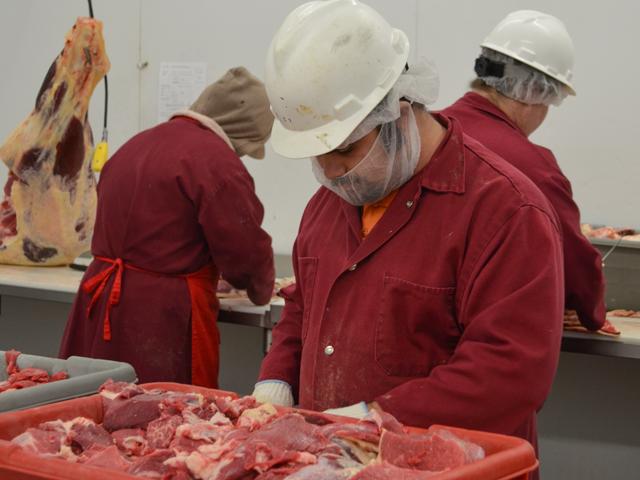Employees: Packers Conspired on Wages
Meat Processor Workers Allege Companies Conspire to Keep Wages Less Competitive
LINCOLN, Neb. (DTN) -- The majority of the largest meatpacking companies in the U.S. conspired to keep workers' wages low in order to control costs in violation of the Sherman Antitrust Act, according to a class-action lawsuit filed by three employees of those companies in a federal court in Colorado.
The companies include 10 red-meat processors and several of their subsidiaries that collectively produce about 80% of the red meat sold to U.S. consumers, according to the lawsuit in the U.S. District for the District of Colorado. The lawsuit also names two consulting companies as defendants. Two of the suing employees are from Iowa and the third from Georgia.
The companies named in the class action account for about 140 beef and pork processing plants, including those owned by JBS USA Food Company, Smithfield Foods Inc., Cargill Inc., Hormel Foods Corp., Triumph Foods LLC, American Foods Group LLC, Seaboard Foods LLC, National Beef Packing Co. LLC, Agri Beef Co., Perdue Farms Inc. and a number of their subsidiaries.
At least since 2014, the lawsuit said, the companies "conspired and combined to fix and depress" compensation paid to employees.
"Senior executives of each defendant processor established and approved those hourly wage rates, annual salaries and employment benefits at corporate headquarters during the class period," the lawsuit said.
"This highly regimented process for determining compensation allowed defendant processors to compare compensation practices -- and collectively suppress compensation -- across their workforces."
In doing that, the lawsuit alleges, the companies designed, implemented and "concealed" a compensation survey that covers dozens of positions at the plants.
From 2014 to 2019, the lawsuit alleges, a "secret group" of red-meat processing executives designed a detailed red-meat industry compensation survey for processors to complete each year.
"Defendant processors hired WMS, a compensation-consulting firm, to administer the annual red-meat industry compensation survey in order to confer a veneer of legality on defendant processors' illicit information exchange," the lawsuit said.
"During the class period, Jonathan Meng, WMS's president and the survey's administrator, warned the defendant processors that they were improperly exchanging future compensation data in a manner that was inconsistent with federal antitrust law. But defendant processors paid his warnings no heed for years."
P[L1] D[0x0] M[300x250] OOP[F] ADUNIT[] T[]
COMPANY RESPONSES
When contacted by DTN, Cargill provided the following statement: "Cargill conducts business in a legal, ethical and responsible manner. The company denies any and all wrongdoing. While we cannot comment with specificity during the pendency of litigation, Cargill sets compensation independently to ensure that it pays fair and competitive wages to employees in each of the company's plants."
Smithfield Vice President of Corporate Affairs Jim Monroe said, "We have no comment at this time."
A spokesperson for Perdue told DTN the company doesn't comment on pending litigation.
The remaining seven companies did not respond to DTN's request for comment.
EXECUTIVE MEETINGS
The lawsuit details how processing companies sent executives to in-person meetings with other companies.
"Defendant processors' senior executives extensively discussed, compared, and in turn further suppressed compensation through email and phone communications," according to the lawsuit.
"Those conspiratorial communications included both group emails to senior executives for purposes of aligning defendant processors' compensation practices and bilateral communications meant to adopt time-sensitive plans for future compensation."
In addition, the lawsuit outlines monthly meetings held by pork processors during which they "exchanged detailed, current, and non-public" compensation information.
"In furtherance of their conspiracy to depress class members' wages, defendant processors also entered into illegal 'no poach' agreements with each other to refrain from recruiting one another's employees," the lawsuit said.
"For example, counsel's investigation revealed that in 2016, defendants Iowa Premium LLC and JBS entered into an illegal 'no-poach agreement' regarding their Tama and Marshalltown plants in Iowa. The former director of human resources of Iowa Premium explained that JBS and Iowa Premium agreed not to 'solicit or poach each other's employees.'"
The alleged conspiracy was used, the lawsuit said, to increase company profits by reducing labor costs.
"The intended and actual effect of defendants' conspiracy to fix compensation has been to reduce and suppress the wages, salaries and benefits paid to class members since January 2014 to levels materially lower than they would have been in a competitive market," the complaint alleges.
"The compensation of red-meat processing plant employees comprises a significant share of each defendant processor's total operating costs. As of October 2018, labor costs made up approximately 60% to 70% of beef- and pork-processing plants' operating costs."
COMPENSATION DECISIONS
Compensation decisions were made at each company's corporate headquarters, the lawsuit said.
"The fact that they did so at the corporate level reflects the significance of labor costs to their overall profitability," the complaint said.
"While local plant managers sometimes made recommendations for wage adjustments, senior executives at each defendant processor's corporate headquarters ultimately determined and approved workers' hourly wages, annual salaries and employment benefits. In the absence of the conspiracy, defendant processors, their subsidiaries and related entities would have competed with each other for labor during the class period by offering higher wages, higher salaries and superior benefits to class members."
Todd Neeley can be reached at todd.neeley@dtn.com
Follow him on Twitter @DTNeeley
(c) Copyright 2022 DTN, LLC. All rights reserved.




